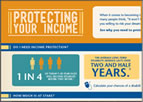Disability Insurance
 |
Protect your most valuable asset - your income.
If you are unable to work because of sickness or injury, disability income insurance can help you meet expenses and maintain your standard of living. It can help you pay bills like your mortgage, tuition and car payments, and help cover expenses for food, clothing and utilities. By replacing a portion of your income, disability income insurance can help provide financial security until you get back on your feet and return to work.
Statistics show that in the US a disabling accident occurs on average once every second. In fact, nearly 18.5% of Americans are currently living with a disability, and 1 out of every 4 persons in the US workforce will suffer a disabling injury before retirement.
Don’t let the word disability throw you. Many of us conjure up visions of crutches and wheelchairs when we hear that word. For purposes of these policies, however, you are considered disabled if, as a result of either accident or illness, you are unable to engage in the substantial and material duties of your occupation. Thus, sometimes even stress can lead to a disability claim.
Think that you have all the bases covered if you have a group plan at work? You would do well to read the fine print. While some plans are quite good, most group plans provided by employers will typically cover about 60% of income. The payments are taxable and many times the benefits are capped and durations limited so it is important to carefully review the documents to understand what level of protection is actually being provided. Sometimes it is advisable to implement a private plan to supplement a group sponsored policy. The private plans will provide a higher level of income replacement and generally do soon a non-taxable basis.
For people who are self employed or not covered by group plans, individual plans are highly recommended. Business owners, especially, should consider opting out of workers comp and implementing an individual disability insurance policy because a well designed policy will provide much better benefits at a cost level typically lower than workers comp.
What would happen if you become disabled or ill and could not work?
Could your employer continue to pay you? How much would they pay you? When would your employer have to hire a replacement?
Could you live on savings? If you saved 10% of your income each year, one year of disability could wipe out 10 years of savings. Can you afford that?
Could your spouse or partner earn enough and be a parent, private nurse, companion and employee- all at the same time?
Could you collect Social Security? You cannot collect benefits until the end of the fifth month of total disability and only if it is expected to last 12 months or more. What will you do if your disability doesn’t meet those requirements? Even if it does, can you wait six months for payment?
Could you count on family, friends or charity? Would these sources have funds for you to use? Do you want to depend on them?
Protection for Business Owners
If you own a business, no matter how comprehensive your medical coverage may be, or how much individual disability insurance you may have, it’s important to have money available to help cover monthly expenses for your business if you become disabled. Expenses such as: employee salaries, rent, utilities, maintenance, taxes, interest on business loans, and so on.
Coverage is flexible and can be tailored to your business needs and budget. And premiums may be tax deductible. Certain business professionals who are sole proprietors, partners and stockholders/employees of a business may use premiums for the policy as a direct business expense.



